So you’re moving to Amsterdam? Excellent choice! It’s a great city that thrives with energy, history, and culture. But where should you live in Amsterdam?
Of course, there’s not just one correct answer to that question. So we’ve done the research to bring you the ultimate guide to Amsterdam neighbourhoods!
READ MORE | 9 things that will surprise you when you move to Amsterdam
- Living in Amsterdam
- The most popular neighbourhoods in Amsterdam
- The city centre: in the midst of the hustle and bustle
- Amsterdam-Zuid: international vibe and nature
- Amsterdam-Oost: echoes of the east
- Amsterdam-West: up and coming neighbourhoods
- Amsterdam-Noord: the coolest neighbourhood in Amsterdam
- Amsterdam Nieuw-West: vibrant communities and parks galore
- Amsterdam-Zuidoost: the entertainment paradise
- The IJ and IJburg: the reclaimed islands
- Buitenveldert and Amstelveen: Grand architecture
- How about living outside of Amsterdam?
Living in Amsterdam
Although in many ways Amsterdam is a fast-paced cosmopolitan European capital, when you live here, it can feel like a small town. Snug little neighbourhoods are tucked away all over the city, creating little oases of residential quiet.
READ MORE | 33 best things to do in Amsterdam [UPDATED]
City life, bars, restaurants, clubs, museums, and theatres are rarely more than a 30-minute bike ride from anywhere in the city. And no matter where you’re coming from, you’ll love Amsterdam’s international feel with people from all over the world.
Half of the city’s 1.2 million residents are non-Dutch in origin. People of different backgrounds (180 different nationalities at the last count) have been settling in this melting pot since the Golden Age.
The most popular neighbourhoods in Amsterdam
Amsterdam is a big city, and it can be overwhelming to figure out where to live. As internationals ourselves, we’ve broken it down for you into some handy subsections.
The city centre: in the midst of the hustle and bustle
Love Golden Age grandeur and spaces crawling with tourists? Images of Amsterdam often depict the beautiful monumental warehouses and elegant gabled mansions along the Singel, Prinsengracht, Herengracht, and Keizersgracht.
These form the inner canal belt, or grachtengordel, of Amsterdam. The wealthy merchants of the glorious Golden Age spared no cost on building materials and elaborately decorated the facades of their prestigious homes.
READ MORE | The Amsterdam canal houses: why are they so wonderfully weird?
Nowadays, these pontifical houses are often split up and converted into smaller apartments. Expensive as it is, the picturesque inner city — with its typical bridges and pretty houseboats along the tree-lined canals — makes for very pleasant living.
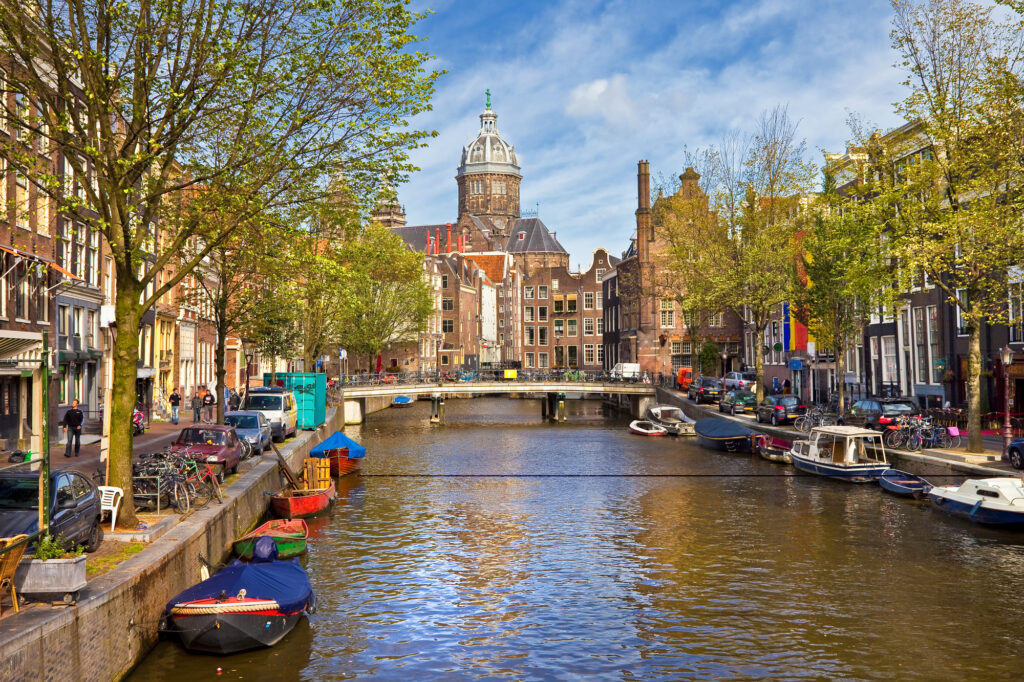
But be warned, there is a downside. The streets are often crowded, and in summer, there is a constant stream of tourist boats passing along the canals.
De Jordaan is arguably the most exquisite neighbourhood of Amsterdam. A kaleidoscope of narrow streets, lined with cute and quirky houses, markets, shops, and cafés make this former working-class quarter a favourite hangout for tourists and locals alike.
Although the vibrant, bohemian Jordaan is an absolute must-see for visitors, houses here are cramped and rents high, so this neighbourhood might not be everybody’s cup of tea.
Amsterdam-Zuid: international vibe and nature
For internationals moving with a young family, the borough Zuid (South) is definitely a good place to start looking when wondering where to live in Amsterdam. It’s not far from the city centre, and it’s bordered by Amsterdam’s largest city park, the Vondelpark.
Zuid has many residential neighbourhoods with privately owned, well-preserved 19th-century houses. Old South includes desirable neighbourhoods in Amsterdam like Duivelseiland and the areas around Museum Square and south of Vondelpark. The apartments are usually spacious and well-built.
The Diamantbuurt, Rivierenbuurt, Stadionbuurt, and Apollobuurt are known as the Nieuw Zuid (New South). The neighbourhoods were built in the 1920s and 30s with sound, comfortably-sized housing, popular among well-off Amsterdammers and internationals.
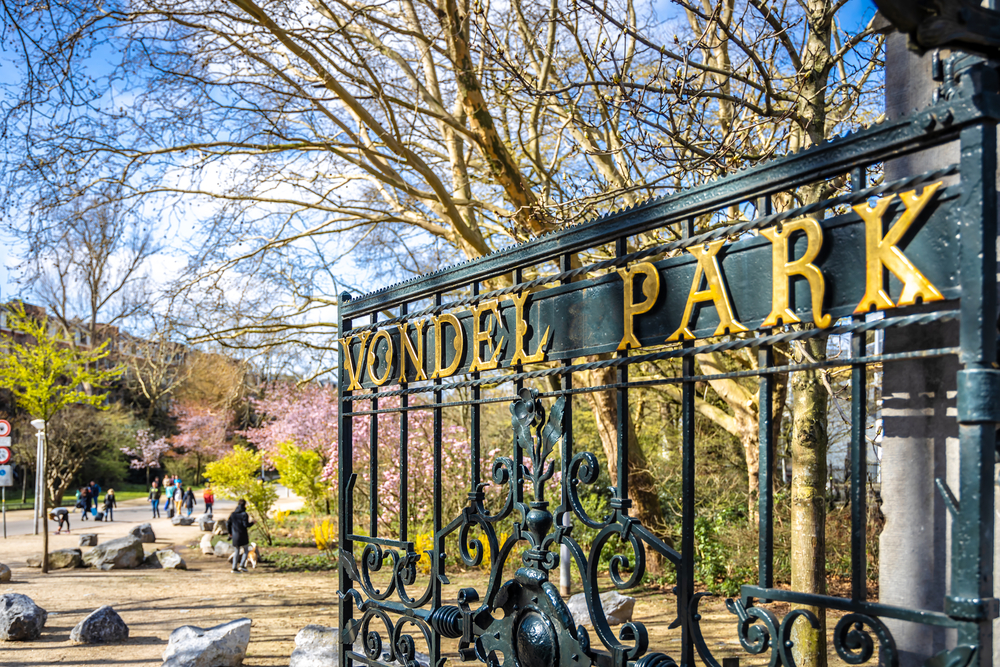
READ MORE | Btw, turns out public sex in this Amsterdam park is LEGAL
Less up-market and more colourful, vibrant, and funky is de Pijp, popular among a younger crowd. Although it has greatly benefited from government regeneration in recent years, do watch out for remnants of the ‘revolution’ building period. Cheaper, but often poor quality, badly-insulated, poky apartments.
The Zuidas is also a place you shouldn’t miss. It’s home to many businesses and is a rapidly growing centre of development. It’s exceptionally popular with internationals, as many work in the area. There are also heaps of new apartments in the area, so plenty of options.
Amsterdam-Oost: echoes of the east
Still not sure where to live in Amsterdam? Perhaps in Amsterdam-Oost. Passing down through the contemporary Eastern Docklands, or Oostenlijke Havengebied, you’ll find the older neighbourhoods of Amsterdam: Indische Buurt and Transvaalbuurt.
Amsterdam-Oost is a green and open-plan neighbourhood with good housing, lots of sports fields and city gardening plots. It’s close to the A10 ring road with good connections to the city.
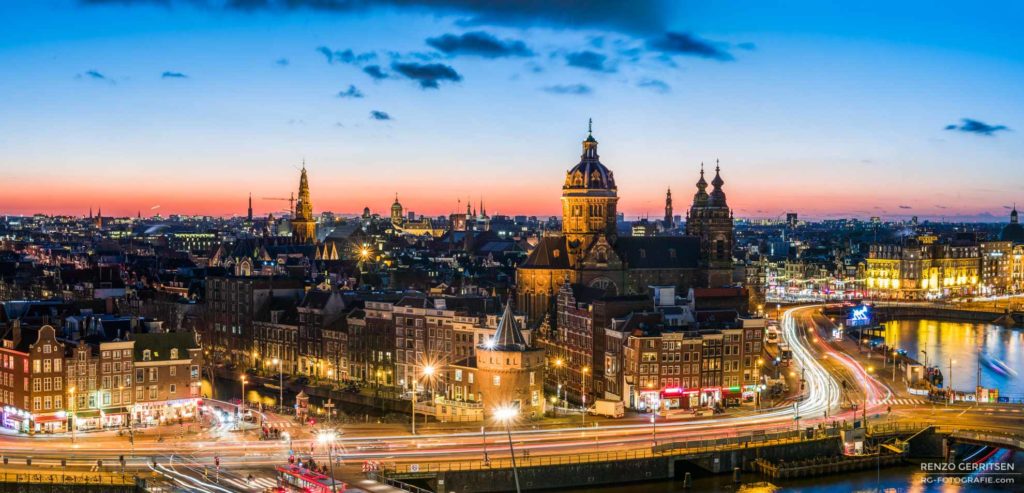
Dating from the 1920s to the 1940s, these areas have been undergoing rapid gentrification since the 90s. Ethnically diverse and bustling with colourful shops and markets, the housing is typically three stories plus an attic (with a shop at street level), which you see in much of Amsterdam.
There’s also the Watergraafsmeer, one of the most low-lying areas of Amsterdam, which was taken back from the sea in the Middle Ages.
Amsterdam-West: up and coming neighbourhoods
Closer to the centre, however, de Baarsjes and Bos en Lommer (or BoLo, as the locals call it) are becoming more popular among students and families and have a large multicultural community. Colourful markets and mosques rub shoulders with trendy cultural establishments and green open spaces.
Westerpark is also a lively, mixed neighbourhood popular with young families and artists. As in BoLo, rents are relatively affordable, and the city centre is only a 10-minute cycle ride away.
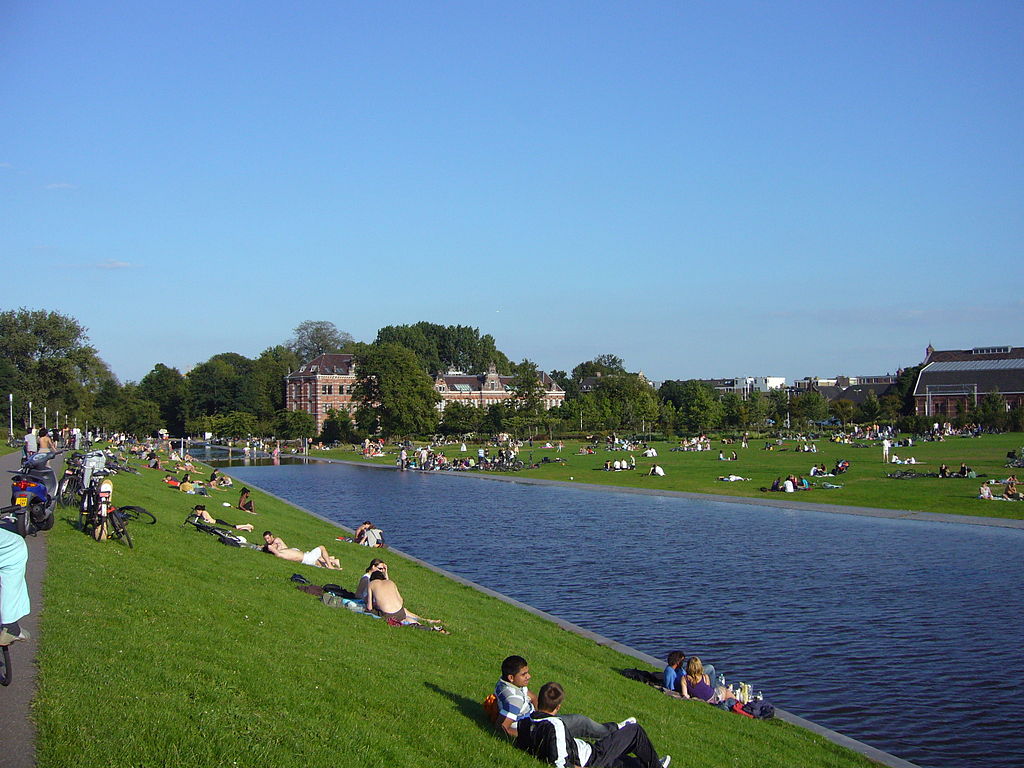
Westerpark is also the name of the beautiful city park, which also hosts a TV studio, several music venues, trendy restaurants, a club, and a cinema. These are situated in the monumental industrial buildings preserved from older days when the city’s gas factory was situated here.
On the far side of Westerpark, the pretty Spaarndammerbuurt is becoming hipper by the day, with nice little shops and cafés springing up and affordable apartments in renovated housing blocks.
Though house hunters have long ignored this neighbourhood in Amsterdam, gentrification is turning it into an attractive little neighbourhood to live in, well worth checking out.
Amsterdam-Noord: the coolest neighbourhood in Amsterdam
This borough is the latest up-and-coming area of Amsterdam. Noord is basically the entire area north of the IJ River. It’s reachable by metro and ferry (just hop on with your bicycle!) or by bridge or tunnel if you’re driving.
It’s huge and has a little of everything — quaint residential neighbourhoods with family homes with gardens, lots of green parks, and water. The former NDSM-shipyard is now a funky area settled by artists and new media creatives. It hosts festivals and a huge monthly flea market.
Noord used to be relatively cut off from the rest of Amsterdam, but since the area behind the station was redesigned, access to the ferry is much easier.
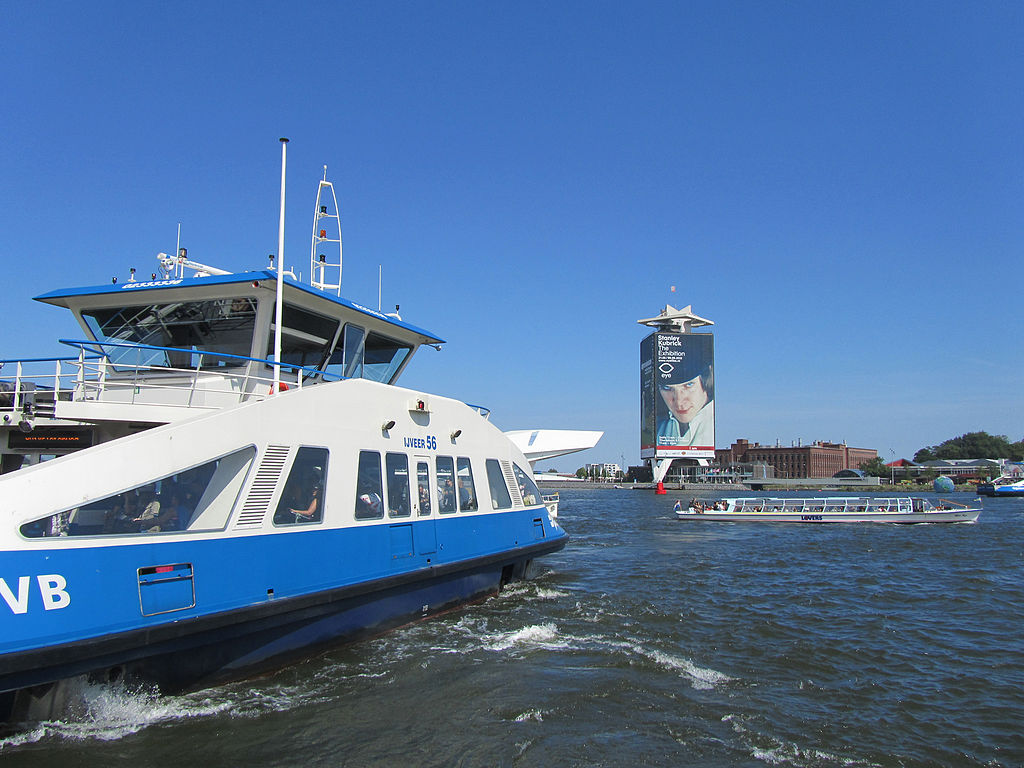
The ferry crossing is fast and frequent (every few minutes), and there is also a new metro connection, making Noord’s popularity explode. Modern apartments are springing up everywhere, yet it still doesn’t feel cramped.
It’s right next to the city centre, only a stone’s throw from the countryside and dotted with cute little villages. It’s quiet, yet the scene is hip. So for some, this might be exactly what you’re looking for.
Amsterdam Nieuw-West: vibrant communities and parks galore
To the west of the city centre lies the sprawling borough of Nieuw-West, characterised by the drab urban neighbourhoods of Osdorp, Sloten, and Slotervaart. This place is home to a vibrant community, many up-and-coming hotspots, and stunning parks.
Amsterdam Nieuw-West is a relatively quiet residential area which, since 2001, has been subjected to various urban renewal projects. This means that thousands of new homes were built — and that these neighbourhoods have plenty of space to host you. 😉
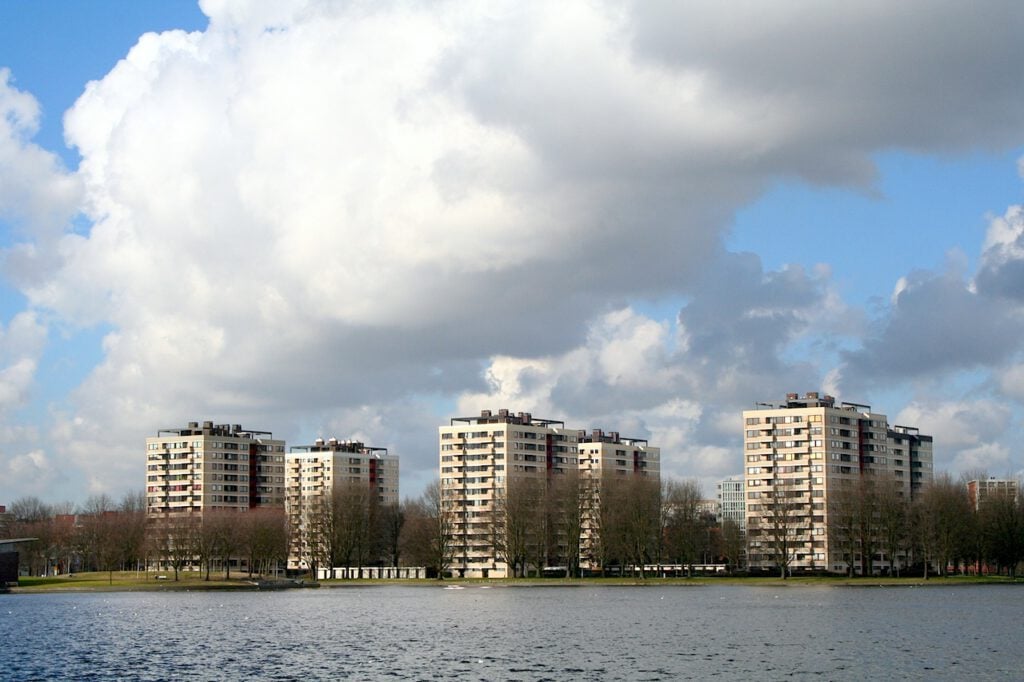
Though quiet and laid-back, Nieuw-West has all the amenities you need: from supermarkets to gyms to its very own shopping district. And of course, the bustling city centre is easily reachable by bike or tram.
READ MORE | Public transport in the Netherlands: the complete guide
The local Sloterpark is a huge park at the heart of the district that offers plenty of recreational activities. Petting zoo? Yes, sir! Great running routes? You got it! A lake for swimming? Jazeker!
Amsterdam-Zuidoost: the entertainment paradise
We have Amsterdam Zuid and Amsterdam Oost, but there’s also Amsterdam-Zuidoost! This city district includes the neighbourhoods of Bijlmermeer, Venserpolder, Gaasperdam and Driemond.
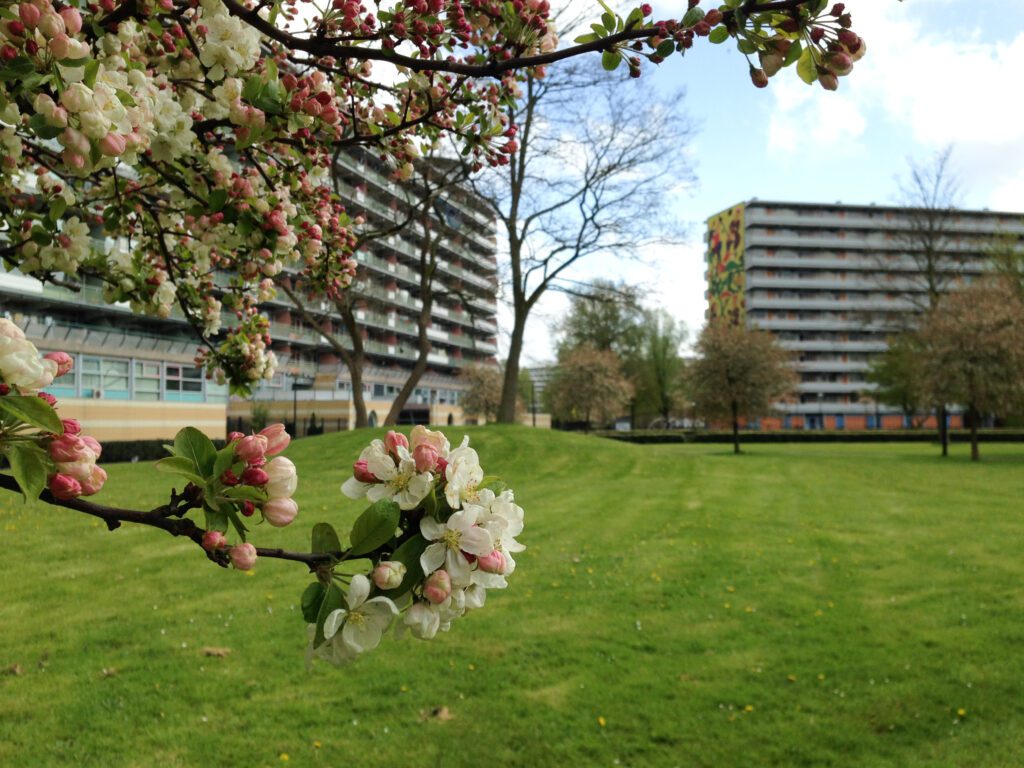
Zuid-Oost lies further away from the city centre, and therefore has cheaper housing! Despite the distance, this place always has a lot going on, and whether or not you live here, you’ll probably make your way down to Zuid-Oost at some point for entertainment purposes.
In fact, Zuid-Oost is often dubbed the entertainment paradise of Amsterdam. Why’s that, you ask? Well, because it’s home to the city’s football stadium, the Johann Cruijff ArenA, and its two biggest concert venues, the AFAS Life Arena and the Ziggo Dome.
The IJ and IJburg: the reclaimed islands
What could be more Dutch than reclaimed land? North-east of the city centre, in the river IJ, lies a string of conjoined man-made islands.
The Java, IJ, and KNSM islands, formerly owned by the Royal Dutch Steamboat Shipping company, were redeveloped into an up-market residential area in the 90s. You’ll find modern apartments with spacious interiors and great views across the river.
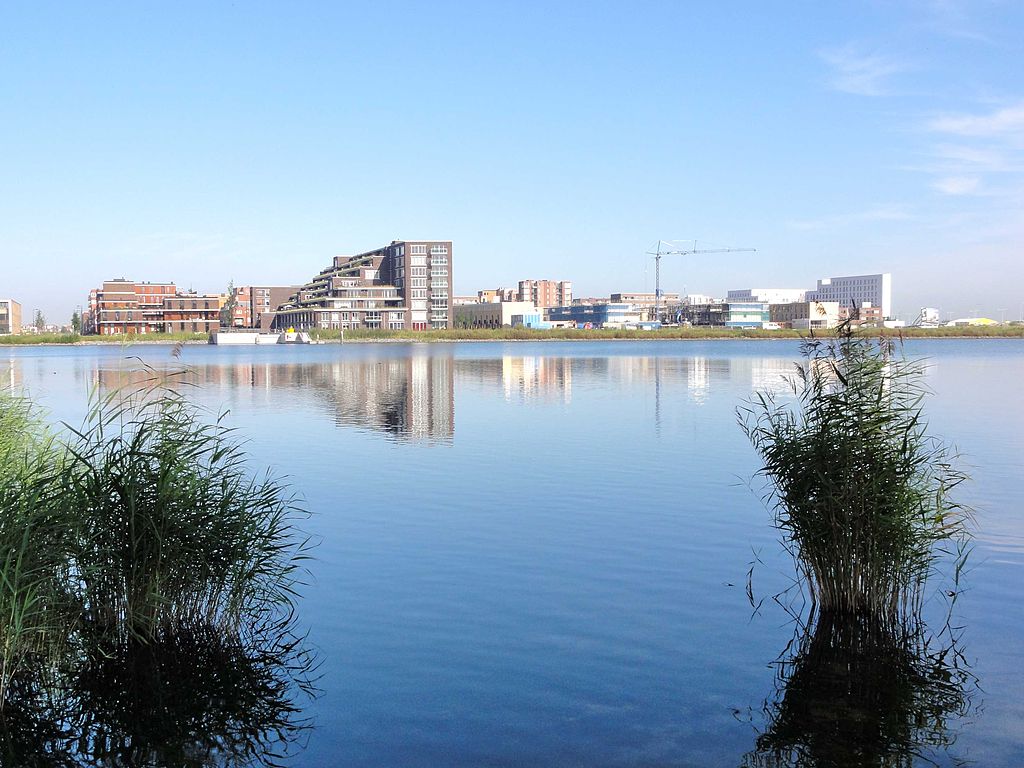
READ MORE | The Dutch built cities on sinking land: how will this fare with climate change?
Further east lay the new artificial islands of IJburg, with large modern homes for those adventurous pioneers who don’t mind the 25-minute tram ride into town (yes, this is considered a long commute in Amsterdam). A big summer attraction here is the artificial city beach of Blijburg, with its groovy Ibiza-like vibes.
Buitenveldert and Amstelveen: Grand architecture
Many of the buildings in Nieuw Zuid are designed in the striking Amsterdamse School style of architecture — decorative dark red brick masonry with beautiful round ‘organic’ forms.
Popular as it is, rents in Nieuw Zuid are generally high, and parking space is scarce. If that feels claustrophobic, it might be worth looking slightly further south, to Buitenveldert and Amstelveen. There, you’ll find lots of open green spaces, wider streets, houses with gardens, and plenty of parking space.
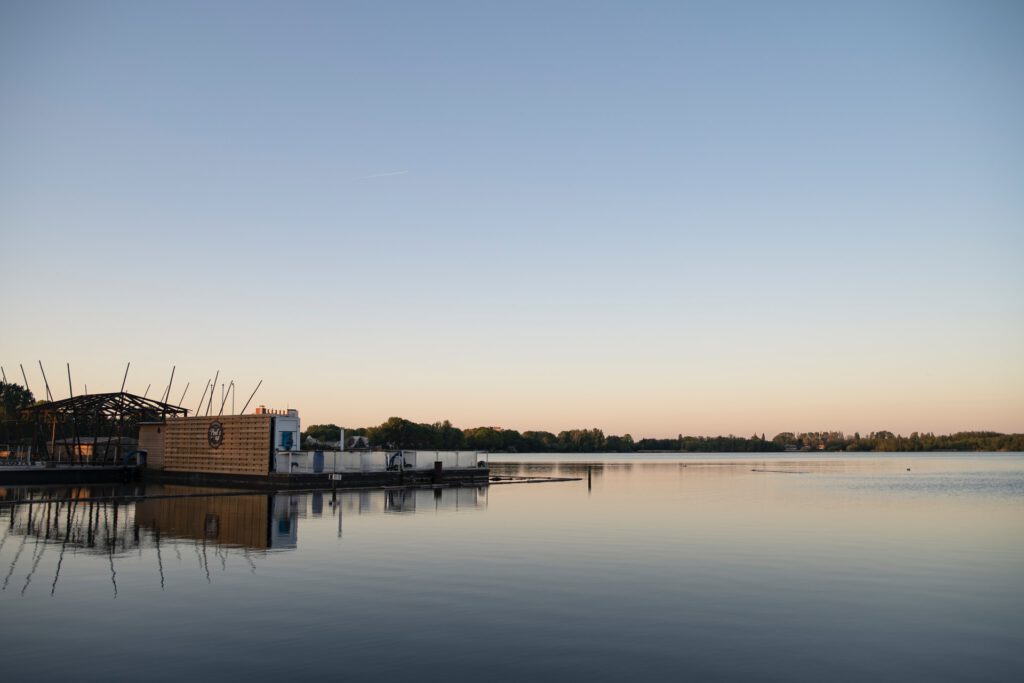
Amstelveen is actually a suburb of Amsterdam, but public transport into the city is excellent, and there are lots of restaurants and cafés. It’s also right next to the green lung of the city, the Amsterdam forest.
How about living outside of Amsterdam?
We won’t lie to you: finding a place to live in Amsterdam is hard.
To bypass the housing crisis (as far as that’s possible) and avoid the city’s crowds and tourists, many people opt for an alternative: living outside of Amsterdam in a nearby city or town.
By deciding to live near Amsterdam rather than in it, you can save some serious cash (and nerves 😉), while still profiting from those big-city-perks whenever needed. Thanks to the Netherlands’ great public transport network, you can easily reach the capital within minutes.
Curious? Then it may be worth checking out the Amsterdam Metropolitan Area (AMA)! This comprises 30 municipalities and two provinces (North Holland and Flevoland). The most popular places to live near Amsterdam are:
- Amstelveen
- Almere
- Haarlem
- Zaandam
- Purmerend
- Diemen
- Hoofddorp
Anything to add to this neighbourhood guide of Amsterdam? Or on where to live in Amsterdam? Tell us in the comments below!

“The British School is located here and the International School is just a short cycle ride away.” The International school is several kilometres away at the bottom of Amstelveen, it would take at least 20 minutes to drive there from the WTC, the Amsterdam International Community school is in the same area and is a short cycle away! Amstelveen is also not a suburb of Amsterdam, Amsterdam, in fact, has 3 crosses in it’s flag in deference to the four in Amstelveen’s flag, they are separate entities, different councils. Also De Pijp isn’t full of artists and students, mainly hipsters these days with every shop turning into a cafe, although around Sarphatipark there are still a lot of families, it’s a nice but expensive place to live.
Let me be a bit a negative
I like to call Sarphatipark the “So-farty-park” because it smells unbelievably of dog shit, and on warmer days you even get the whiffs out in the surrounding streets … I walked through the park once, and never again.
In De Pijp, Van Woustraat – terrible traffic, which may now improve with the redesign of the street – especially between Ceintuurbaan and Jozeph Israelskade is a particularly unpleasant place, with lots of aggressive delinquents from the Diamantenbuurt and Nieuwe Pijp hanging out on street corners. It’s not a place I would recommend young women to walk alone at night. Many of the small shops have no active business going and I suspect they are mostly used for laundering drug money. However cross the bridge into the Rivierenbuurt and things become more residential and pleasant – or boring depending on your age.
Need information on fairly small apartments or condos and prices. If there is water view that would be lovely. Or a outside space. 1 bedroom 1 bath.
Vinkeveen is beautiful. Public transport is limited but it’s only 20 minıtes away from Amsterdam by car and 15 minutes to the International School of Amsterdam. Abcoude is also a beautiful neighborhood just a stone throw away from Amsterdam.